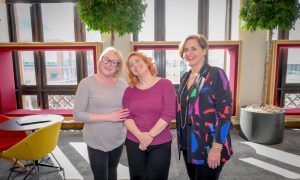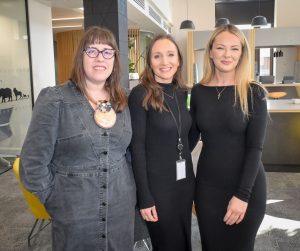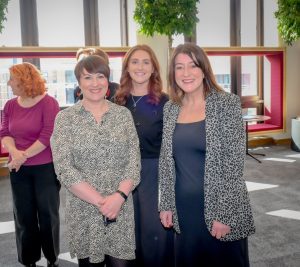Accelerating Action: Brindleyplace’s female leaders driving workplace change


The event centred on this year’s IWD theme, ‘Accelerate Action,’ highlighting the urgent need for gender equality, which, at the current pace, won’t be achieved until 2158, according to the World Economic Forum.
The discussion delved into the challenges and opportunities of driving gender equity in the workplace, focusing on allyship, mentorship, and policy advocacy. The panellists shared their personal experiences, highlighting the systemic barriers women continue to face and the steps required to dismantle them.
Challenging Workplace Bias: The Subtle Struggles

Chantal Bird (Unity Trust Bank), Abi Hanson (TheBusinessDesk), Juliet Halfhead (Deloitte), Sam Uren (SLC Rail), Juliet Collings (Core), Helen Collins (Avison Young), Deborah Bradshaw (Brindleyplace), Madeline Reynolds (Individual Restaurants), Jo Kelly (Landmark), Anna Cooper (TheBusinessDesk), Lucy Hancock (Avison Young), Linzi Stauvers (IKON Gallery), Jane Bagni (Michael Page)
Sam Uren, engineering director at SLC Rail, addressed the subtle nature of bias in the workplace. She said: “I can almost deal with it when it’s overt because you can confront it. But now, it’s so under the radar – why aren’t they making contact with me? Why are they speaking over the top of me? Didn’t I just say that two minutes ago?”
She referenced a comment by Mark Zuckerberg about the workplace needing more “male energy”. It’s influenced many to jump on the back of Zuckerberg’s views, reinforcing the narrative that women need to conform to male leadership styles to succeed.
Helen Collins, managing director for the Midlands at Avison Young, reflected on her career trajectory, beginning as a 16-year-old on a YTS scheme.
She said: “I was really lucky to have a female boss early on – she was a taskmaster, but she was also supportive. I didn’t know how I wanted to be as a manager, but seeing her succeed and conduct herself at board meetings showed me what I could do.
“I’ve heard stories of women pulling the drawbridge up behind them, not helping others climb the ladder. That experience shaped me to always make a point of supporting the women I work with”.
Nicole Steed, asset management director at BlueNoble shared her encounters with gender bias. She said: “I’ve been the only woman in meetings, and people assumed I was taking the minutes. They spoke over me or said things they shouldn’t have because they didn’t know who I was. But I’ve had male colleagues call them out, which is great. That kind of allyship and support has really helped me get to where I am today”.
Despite this progress, Nicole said many instances do go unchallenged. She said: “Sometimes, I wonder, ‘Is it because I’m a woman?’ And then I start to think, ‘Am I overthinking it?’ ‘Would you just speak over anyone?’ That’s why women struggle to call it out because it’s not overt.”
Workplace Culture: Creating Inclusive Environments

Abi Hanson, Sam Uren, Juliet Collings
Sam Uren challenged the idea of workplaces being structured around traditional male behaviours.
She said: “We need to stop thinking about a gender split and start focusing on whether a workplace operates in a ‘male’ or ‘female’ way. There are positive attributes from both that are needed to be a great leader.
“Some women do pull the draw bridge behind them because they think that they’ve got to have male qualities in order to get on, whereas a female quality of caring for your staff and thinking about creating a great workplace will be great for staff”.
She highlighted Brindleyplace as an example of a work environment that fosters inclusivity.

She said: “Creating balance for everybody comes from fostering a sense of belonging. Instead of trying to get more women to fit into existing structures, we need to create environments where diverse perspectives are valued.
“In the US, companies are having to strip back any DEI targets because of the threat of litigation. Most global businesses would say it’s a reframing rather than retreat, and will rebrand ‘diversity and inclusion’ as ‘belonging’ – taking a more holistic view”.
Jane Bagni, business director at Michael Page, emphasised the importance of breaking hiring biases. She said: “You can’t keep hiring people who look and think like you. We need diverse opinions and proper reasoning behind hiring decisions”.
Unity Trust Bank’s talent acquisition partner Chantal Bird, advocated for redefining leadership qualities. She said: “Soft skills like empathy and people management are often seen as feminine, but they’re critical for effective leadership. We need to strip back stereotypes and focus on skill sets.”
The Confidence Gap and Structural Challenges

Linzi Stauvers, Lucy Hancock, Madeline Reynolds
Nicole Steed pointed out that confidence disparities often hold women back and that, “men seem to be more confident in their abilities and potential, while women tend to downplay theirs.
“Women struggle to return to the office post-maternity leave. I think the move to share leave will benefit both men and women as both with experience the feeling of returning to work and it will help with stereotypes around this”.
Deloitte is one firm that changed its policy so that all parents are eligible for 26 weeks of fully paid leave. This came after research by the firm found more than half of working mothers (57%) have had to reduce working hours because of their co-parent’s workplace inflexibility.
Juliet Halfhead said that men on her team have utilised the new policy, but reminded the round table that “not everyone has to be a role model for everything. Part of the decision does stem from society’s views and it just has to work for you”.

Jo Kelly, Anna Cooper, Jane Bagni
Lucy Hancock, associate director at Avison Young, shared her post-maternity leave struggles.
She said: “I’ve got peers who have decided to go part-time or not come back after maternity leave and it means that people at my level in the industry are leaving and we’re missing that talent. Before my maternity leave, I had no issues working in a male-dominated industry. But when I returned, everything changed. I had to educate myself on systemic barriers to realise it wasn’t just me”.
Deborah Bradshaw, estate manager at Brindleyplace, opened up about ‘imposter syndrome’ and the importance of focusing on what you can contribute, regardless of gender.
She said: “I’ve experienced imposter syndrome – even today, I felt intimidated by this very event. But while I was here, I received messages from my team, encouraging me and saying, ‘Bet you’re smashing it!’
“It’s great to have feminist men on my team – they help balance out the misogyny that can sometimes come from more traditionally-minded peers.
“I believe it’s important to focus on what you can contribute, whether you’re male or female. Don’t focus on your gender in a group; instead, concentrate on how you can add value. Champion your abilities and push your team forward by emphasising skill and talent above all else.”

“We’re all in this together, and in business, everyone is striving for success. The key is to live as your most authentic self, embrace your vulnerabilities, and share them instead of putting up a façade.
“Adaptability is important, but your true value comes from being genuine. When you bring out the best in yourself, you also uplift those around you.
“It’s not just about networking or individual opportunities. It’s about how you conduct yourself, the impact you have on others, and the way you engage in your daily interactions. What truly matters is how you call things out, how you lead, and the influence you have on those around you.”
The Power of Speaking Out

She said: “I grew up thinking we lived in a free and fair society, only to realise that progress isn’t linear – we can go backwards. As a senior female leader, I recognise my responsibility to continue pushing for change.
“I’m at the stage in my career now where I’ve got a lot of experience and still learning, but I think it’s important as a senior female leader to understand that I am that and to use that positively. Unfortunately, it can be a bit exhausting sometimes, as it does mean that you have to continue to call things out”.
She recalled a stark example of gender bias early in her career: “I was the only female manager at a house-building company and they called me the rottweiler. The first year I was there, all the men received a £200 bonus, and all the women got a frozen turkey”.
Juliet Halfhead stressed the need for continuous advocacy: “I believe we need to stay curious. I think we’re better now at leaning in and not drawing the bridge up and advocating and supporting the females in our team to come through. But I also think we have a role amongst our peers.
“We must call out inequities. I’ve seen women hesitate to challenge each other while waiting for men to step in – that’s not okay. We need to hold each other accountable”.
Moving Forward: Accelerating Change

Brindleyplace’s female leaders urged businesses to take further steps toward gender equity, including fostering allyship, supporting mentorship programs, implementing inclusive hiring practices, and normalising shared caregiving responsibilities.
Juliet Halfhead summed it up: “The key is staying curious about different perspectives and leaning in – whether that’s through mentorship, advocacy, or simply calling things out when we see them. Real progress happens when we all take responsibility”.
With discussions like these, Brindleyplace and the wider West Midlands business community are setting the stage for meaningful change. The road to gender parity is long, but with sustained effort, the timeline will accelerate.
Anna Cooper – Editor at theBusinessDesk.com
Helen Collins – Managing director of the Midlands region at Avison Young
Juliet Halfhead – Practise senior partner of the Midlands at Deloitte
Jo Kelly – Area general manager at Landmark
Juliet Collings – Managing director at Core Marketing & Events
Deborah Bradshaw – Estate manager at Brindleyplace
Madeline Reynolds – Events and sales manager at Individual Restaurants
Nicole Steed – Asset managing director at BlueNoble
Chantal Bird – Talent acquisition partner at Unity Bank Trust
Jane Bagni – Business director at Michael Page
Linzi Stauvers – Artistic director at Ikon
Sam Uren – Engineering director at SLC Rail









